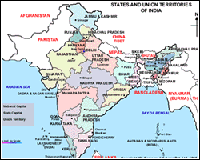| Environment Tourism with Vision - Shobita Punja
|
|||||
What is Value Tourism?
The term 'value tourism' is used to establish a new strategy of sustainable tourism. This form of tourism places the highest value on culture and natural heritage while providing visitors with value for their money and time. This strategy seeks to protect that heritage and culture which is the foundation of the travel industry in this country. The strategy is for, not against tourism. Tourism brings people of one culture into interaction with another. The tourist travels abroad or at home in search of pleasure, leisure, adventure, recreation at historical sites, wildlife parks, beaches, towns and villages. Wherever the tourist travels, the destination is always someone else's home. This home must be respected.
Over the past few years it has been found that the tourism industry has had a destructive effect on the very product it sells, - the destination. The tourism industry is already becoming unpopular in some regions for this reason. Yet tourism does bring to the home, country or region, not only economic benefits but also cross-cultural friendships and understanding.
|
Environment
Adventure activities | ||||
We urgently need to design an alternate strategy for tourism, one that acts as a force for conservation rather than destruction; a strategy for tourism that is both environmentally friendly and which does not damage the cultural ethos of this artistically rich country. We need a humane tourism strategy that is well conceived so that it avoids waste, undue pressure on wildlife, the culture and land of the local people. Why Value Tourism?
The Objectives
In recent years mismanaged wildlife tours have led to changes in the ecology o f several habitats. Excessive and badly managed tiger viewing programmes have resulted in stress on the animals. Similarly, uncontrolled trekking has caused large scale destruction of wildlife and flora, and pollution of the Himalayas. Clearly the industry must review its functioning and evolve a code of self-regulation. Impact and carrying capacity studies must be voluntarily undertaken or promoted, to avoid the over-exploitation of living natural or heritage assets. Tourists should, politely and creatively, be briefed on their responsibilities to the host countries. Airlines could help by incorporating such values into their in-flight publications and announcements. Hotels, through brochures and in-room literature could help discourage the purchase of banned items such as antiques and wildlife products. Hotels that shelter shops which deal in animal skins, ivory and other banned items should cooperate with the wildlife authorities to ensure that such lethal activities do not continue under their very noses. What You Should Know Infrastructure Where You Stay Inappropirate design is, of course, only one facet of the problem. Construction is often undertaken in ecologically fragile habitats such as wetlands. Beaches are often directly encroached upon in contravention of CRZ rules. Rather than wait for censure from the public or from the authorities, perhaps the hotel industry in Goa, for instance, might like to form an internal monitoring body to ensure that one hotel's intransigence does not impact on the reputation of the others. The over-use of natural resources such as land, water, wood and food and the strain placed on civic resources is another aspect of the hotel industry which requires self-examination. Resource depletion is not only damaging to the local environment but is incompatible with the long-term sustainability of the tourism industry. The industry needs to review its land-use policies in relation to needs of local communities such as fisherfolk and forest dwellers. Fortunately, there are some aspects of environmental protection which also make immediate economic sense. Recycling, for instance. If a hotel were to wear its recyling policy on its sleeve, chances are visitors might be less demanding. They would probably not throw towels and linen into the wash after one use if the management reminded them (gently) about the adverse impact of excessive energy use. Smokeless Industry? There is considerable scope for the industry to develop more fuel consumption techniques and to rationalise transport networks so as to minimize destruction and maximize utilization. Studies require to be conducted to analyze the impact of noise, air, water pollution. Also the impact of flight paths of aircraft on affected communities. Access roads are often more destructive than the projects themselves. Alignments of roads must take ecological and cultural factors into account. In time people will become disillusioned and will probably join their communities to fight project promoters who are perceived to be acting against their interests. On the other hand, if the industry incorporates the cultural and natural heritage of its host community into the offer made to its guests, the stature of locals is elevated. Some, of course, would be very willing to enroll in training programmes which offer specialised skills. Whenever possible local staff should be trained for managerial and leadership positions. This would ensure that the local population truly benefits from the tourism industry that they support. The tourism industry can and should lobby with government for special concessions to encourage the use of environment friendly technologies. If the principle of consultation with host communities is truly respected, members from the industry could also count on cooperation from NGOs and activists, particularly those who would like to see this coral reef protected, or that community's economic interests defended. Tourism is believed to be one of India's fastest growing industries. Considering its considerable impact on the environment and on communities, however, without the concept of Value Tourism being built in the industry might not find the going quite as smooth at it should be.
Courtesy: Sanctuary Magazine
|
|||||
Editor: Romola Butalia (c) India Travelogue. All rights reserved. |
|||||

 which, hopefully, a consensus code of conduct or ethics can be distilled - are listed below. These are, of course, subject to debate and discussion. There are very many more objectives which will need to be incorporated before the listing is near complete. Nevertheless, at the heart of our rationale is the belief that the tourism trade must incorporate creative and long-term strategies into its objectives. Such objectives must underscore the very real worth of and the threats to - the assets that draw people to our shores. If this is not accomplished, the nation will suffer, and so surely will the business of tourism itself. To ensure valuable and sustainable tourism we must consider our priorities:
which, hopefully, a consensus code of conduct or ethics can be distilled - are listed below. These are, of course, subject to debate and discussion. There are very many more objectives which will need to be incorporated before the listing is near complete. Nevertheless, at the heart of our rationale is the belief that the tourism trade must incorporate creative and long-term strategies into its objectives. Such objectives must underscore the very real worth of and the threats to - the assets that draw people to our shores. If this is not accomplished, the nation will suffer, and so surely will the business of tourism itself. To ensure valuable and sustainable tourism we must consider our priorities:

 Our Heritage
Our Heritage  Before launching new projects and expanding the tourism potential of the destination it is necessary to study the impact such activities would have. There are certain destinations in India, like Khajuraho where hotels have occupancy rates as low as 30 per cent annually. Yet more and more rooms keep getting put up. Should the industry not be looking at a moratorium on new hotel constructions here? Coupled with investments in the destination itself: public toilets, parks, clean shaded streets, smaller museums.
Before launching new projects and expanding the tourism potential of the destination it is necessary to study the impact such activities would have. There are certain destinations in India, like Khajuraho where hotels have occupancy rates as low as 30 per cent annually. Yet more and more rooms keep getting put up. Should the industry not be looking at a moratorium on new hotel constructions here? Coupled with investments in the destination itself: public toilets, parks, clean shaded streets, smaller museums.
 Is tourism really a smokeless, pollution free industry? Not if you really measure the impact of the smoke stacks and diesel generators at work, or the various modes of transport used by millions of tourists each year.
Is tourism really a smokeless, pollution free industry? Not if you really measure the impact of the smoke stacks and diesel generators at work, or the various modes of transport used by millions of tourists each year.